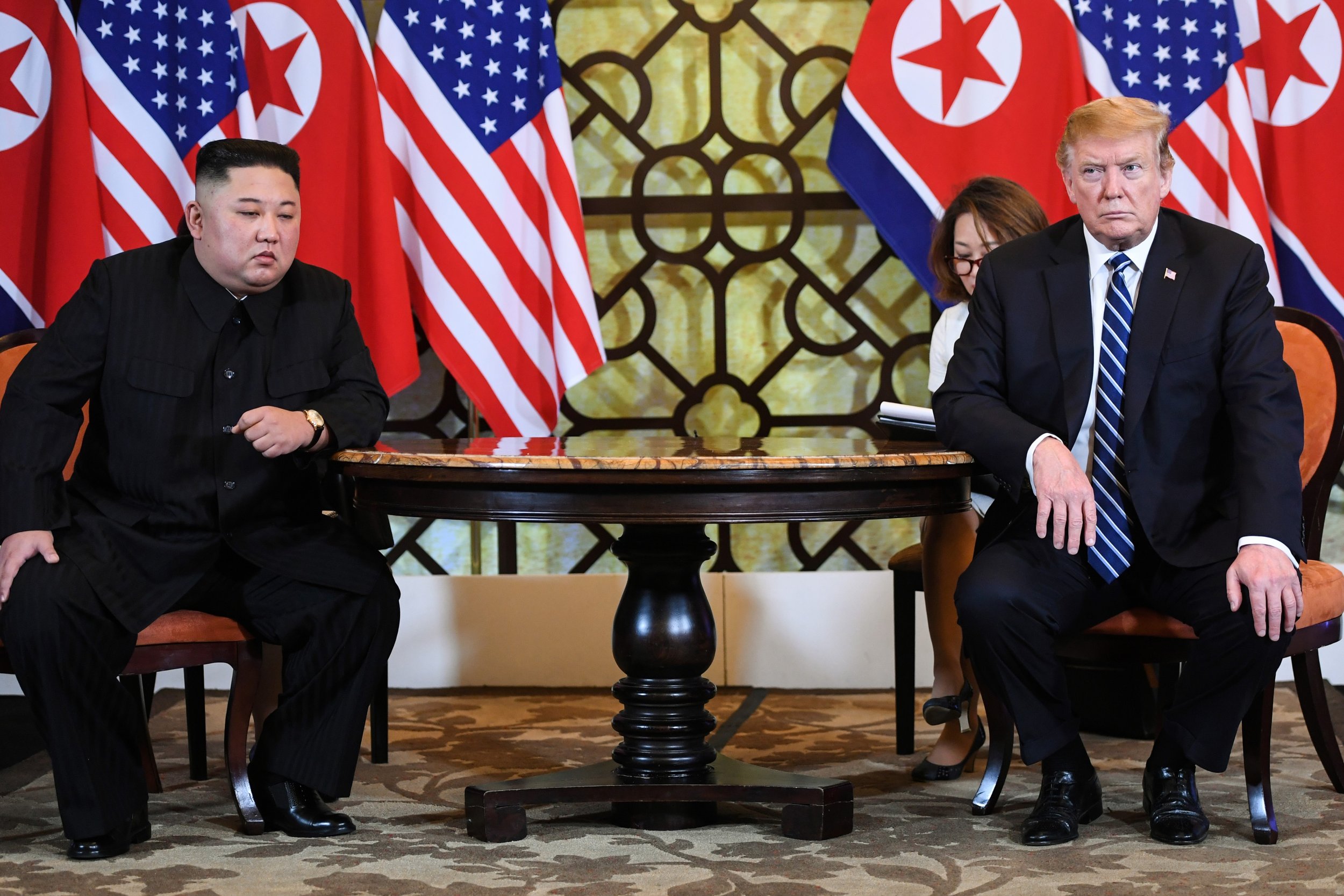
Donald Trump unwound new U.S. sanctions on North Korea claiming they were unnecessary. But the reversal was really a recognition that sanctions have failed to weaken North Korea's economy or make progress towards denuclearization. Trump's meeting with South Korean President Moon Jae-in next week is meant to show that he's still on the case, but it's just cosmetic.
North Korea's economy is on the rise. There are more than 400 private markets permitted by the state with more than 600,000 vendors selling to a rising middle class. They generate an estimated $56.8 million in revenues for the government. State-owned company employees can also pursue other profit-making endeavors. Employment opportunities have increased.
Meanwhile North Korea has kept trade and foreign currency flowing. It illicitly imports petroleum products and sells coal. It engages in cryptocurrency exchanges and cyber-attacks on financial institutions. It sells small arms and military equipment to Iran-backed rebels, Libya and Sudan.
China prioritizes stability of the Korean peninsula over enforcing sanctions. Trade with China in fuel, seafood, silkworms, and cell phones continues.
As the private business sector grows, North Koreans are forming joint ventures in more than a dozen countries in violation of U.N. sanctions. Construction continues in Pyongyang. North Korean manufacturers have replaced blocked foreign imports with locally made goods. Manufacturing of electronic tablets and televisions are rising and using local parts suppliers.
About 70% of North Korea's economy is now market-based. Improvements in daily life have been reported. The country's supply of electricity is up and the cost of coal is down, so North Koreans enjoy better heated homes. Rice prices are stable, and gasoline prices have fallen significantly. Sadly though, the sanctions have managed to interfere with humanitarian assistance getting through.
Western-style economic policies suggest Kim Jong Un may be channeling Deng Xiaoping's path to a more open economy. The South China Morning Post faulted the U.S. for obstructing North Korea's progress, though it has not suggested lifting sanctions while Kim pursues his nuclear program.
Trump's claims that Kim began to denuclearize after their first summit, that North Korea is no longer a nuclear threat and won't have nuclear weapons are blatantly false. Kim is restoring a missile launch site he previously claimed to be dismantling. Satellite imagery shows that just two days after Trump exited the Hanoi Summit, North Korea was rapidly rebuilding a long-range rocket site and already had a prototype of a nuclear armed missile that can reach the U.S., which they've tested and are preparing for more tests. Beyond Parallel identified twenty previously undisclosed missile sites throughout the country, and reported that North Korea has placed some facilities among civilian populations to protect it from U.S. "decapitation attacks."
The international community as well as the U.S. unilaterally have imposed sanctions on North Korea for more than a dozen years. Yet Trump has claimed he alone can denuclearize North Korea, and criticized his predecessors Obama, Clinton and Bush for failing to eliminate the North Korean nuclear threat. He either ignores or is unaware of forty years of prior efforts by the U.S. and other countries to denuclearize North Korea, and the difficulty of dealing with its untrustworthy leaders. They agreed to nonproliferation, nuclear dismantling and freezing their nuclear programs in 1985, 1992, 1994, 1999, 2002 – 2003, 2005, 2007, 2012. Then they breached each agreement by secretly building nuclear facilities, enriching uranium, and conducting missile and underground nuclear tests. They also rejected and disrupted inspections, unilaterally pulled out of agreements, and launched a missile at the South Korean island of Yeonpyeong.
Rather than improving on that record, Trump has given Kim what he always wanted. He halted 70 years of joint military exercises with South Korea, without notifying South Korea's leaders or the Pentagon, and justified it by saying the exercises were expensive (the Pentagon disagreed) and, astonishingly, echoing Kim's criticism of the exercises as "very provocative." Kim's long-term goals include unification with South Korea without the presence or influence of the U.S. That's why Kim returned to his liaison office with South Korea, not as a gesture toward the US.
Incessant global press coverage of the US-North Korean summits and Trump's praise gave Kim respect he lacked when he took over after his father's death. It also helped mitigate world horror regarding Kim's brutal murder of more than 300 North Korean officials including the execution of his uncle, Jang Song Thaek, whom Kim saw as a threat.
Congress hasn't interfered with Trump's approach to North Korea for two reasons. First, the Constitution gives the President broad authority over foreign policy. Second, Republicans in Congress need Trump's base to be reelected, so they won't rein him in.
Neither is an excuse. The Constitution gives Congress the power to investigate. House Democrats can use it to expose Trump's failed North Korea policy by questioning Mike Pompeo, John Bolton and Pentagon and intelligence agency officials on national TV. While they're at it, they can also expose Trump's tailoring of foreign policy for personal financial gain with Russia, China, Saudi Arabia and Qatar. Televised hearings could be effective at eroding enough of Trump's base to free Republicans in Congress from the leverage Trump has over them, and to recapture power that the president has effectively stolen from the legislative branch.
Neil Baron is an attorney who has represented many institutions involved in international markets and advised various parts of U.S. federal government on economic issues.
The views expressed in this article are the author's own.
Uncommon Knowledge
Newsweek is committed to challenging conventional wisdom and finding connections in the search for common ground.
Newsweek is committed to challenging conventional wisdom and finding connections in the search for common ground.
About the writer
To read how Newsweek uses AI as a newsroom tool, Click here.








